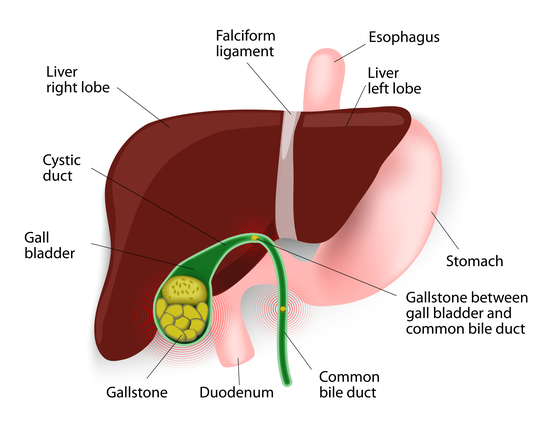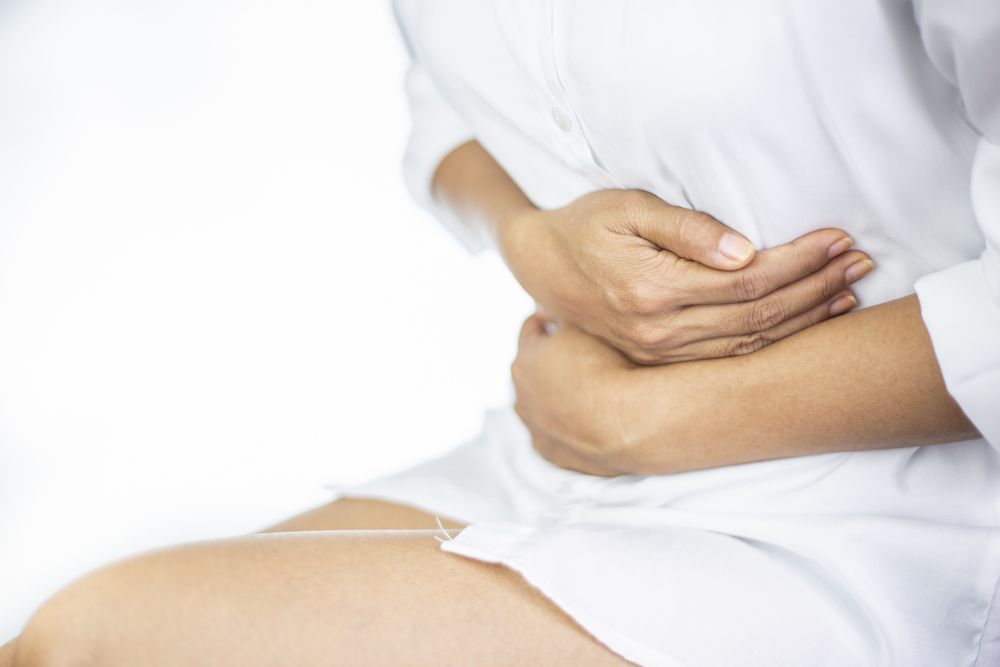What is Gallbladder Disease?
Gallbladder disease is a term used for several types of conditions that affect the body’s bile system. This system includes the liver, gallbladder, and bile ducts. If you’re wondering where your gallbladder is, it is located underneath your liver.
Your gallbladder’s main function is to store the bile produced by your liver. It also passes the bile through a duct that empties into the small intestine. Bile is used to help you digest fats in your small intestine. Sometimes, the bile hardens and forms small, solid particles that we call gallstones.
Types of Gallbladder Disease
Common health issues that can affect the gallbladder are:
Gallstones

Gallbladder disease occurs when substances in the bile, such as cholesterol, bile salts, and calcium build up in the bile system. These substances develop gallstones that block the passageways to the gallbladder and bile ducts.
Gallstones can also form when the gallbladder doesn’t completely empty. And gallstones can range from the size of a small grain of sand to the size of a golf ball.
Types of Gallstones
There are two types of gallstones, cholesterol stones, and pigment stones. Cholesterol stones are the most common type and are typically larger. Pigment stones are smaller but usually more than one pass at a time.
Symptoms and Signs
Oftentimes gallstones do not cause any symptoms. However, as the gallstones grow larger, they can become trapped in an opening or duct inside the gallbladder. When this occurs, you may feel symptoms such as:
- Severe pain in the upper abdomen (gallbladder attacks)
- Pain in the back between the shoulder blades
- Nausea
- Vomiting
- Fever
- Jaundice – a yellowing of the skin or eyes
- Abdominal bloating
- Intolerance of fatty foods
- Belching or gas
- Indigestion
Each individual may experience symptoms differently. Anyone suffering severe pain should consult a doctor immediately.
What Symptoms Can Stones Lodged in the Common Bile Duct Cause?
Stones that become stuck in the common bile duct can trigger a range of symptoms, some of which are similar to those caused by gallbladder stones. Here are the key symptoms to watch for:
- Jaundice: A yellowish tint to the skin and eyes, due to bilirubin buildup.
- Changes in Urine and Stool: Urine may become unusually dark, while stools could appear lighter than normal.
- Cardiovascular Symptoms: Expect possible rapid heartbeat and a sudden drop in blood pressure.
- Systemic Symptoms: Fever, chills, nausea, and vomiting, combined with intense pain in the upper right abdomen.
Key Points:
- Jaundice: Indicates bile flow issues.
- Urine and Stool Variations: Reflect liver and bile duct issues.
- Heart and Blood Pressure: A direct response to pain and bile duct obstruction.
- Fever and Pain: Signals of an infection or significant blockage.
Understanding these symptoms can help you take timely action and seek medical help when necessary.
Cholecystitis
Cholecystitis is the most common type of gallbladder disease. This is a more severe gallstone blockage inside a biliary tract that can cause swelling in the gallbladder. It presents itself as either an acute or chronic inflammation of the gallbladder.
Acute cholecystitis
The main symptom of this acute gallbladder disease is a sudden sharp pain in the abdomen that may last 6 hours or longer. This is commonly referred to as a gallbladder attack. Gallbladder attacks cause pain in the upper right side of the abdomen.
Chronic cholecystitis
This chronic condition is the result of long-term inflammation in the gallbladder. This occurs when the gallbladder does not drain properly.
Symptoms include recurrent abdominal pain. Nausea and vomiting may also occur. Gallbladder inflammation can cause many serious complications like infection, tissue decay, and gallbladder tears.
Both forms of gallbladder inflammation can lead to critical complications. Seek medical attention immediately if a person shows any of the symptoms listed above.
What does a gallbladder attack feel like?
A gallbladder attack usually starts as a sudden pain that grows worse in the upper right or center of the body. This pain can also be located in the back between the shoulder blades or in the right shoulder. While some last minutes, other gallbladder attacks last hours. The fastest way to relieve gallbladder pain is to apply a heated compress, heating pad, hot water bottle, or warm wet towel to the area for 10-15 minutes. Magnesium supplements can also aid in the gallbladder emptying bile and ease spasms and pain.
Some people may experience additional signs and symptoms, such as:
- nausea and vomiting
- a fever
- slight yellowing of the skin
- or swelling in the abdomen
How Long Does a Gallbladder Attack Last?
A gallbladder attack will typically last anywhere between 15 minutes to several hours. Often, the pain can escalate to high levels and can radiate to the left side of the body and to the back. The pain may also come and go over time. Meals high in fat tend to aggravate gallbladder irritations, so reducing fat intake can be helpful.
How to Stop a Gallbladder Attack While It Is Happening:
While pain from a gallballder attack can not be immediately stopped until the gallstone passes, there are actions to take to lessen the pain of gallbladder attacks. Some ways to treat a gallbladder attack while its happening includes:
- Over the counter pain medicine
- Warm compress to the abdomen
- Peppermint tea
Risk Factors for Gallbladder Disease
There are many risk factors for gallbladder disease. A few of the most common risks are associated with gender, age, obesity, and ethnicity.
Other risks include:
- Sedentary lifestyles
- Fat and cholesterol-rich diets
- Family history of gallbladder disease
- Diabetes
- Blood disorders
- Liver disease
- Pregnancy
- Treatment for Gallbladder Disease
How is Gallbladder Disease Diagnosed?
- Medical History and Physical Exam: Your healthcare provider will start by reviewing your medical history and conducting a physical examination to check for symptoms like abdominal pain or tenderness.
- Blood Tests: These help identify signs of infection, inflammation, and issues with liver function, which can indicate gallbladder problems.
- Imaging Techniques: Various imaging tests are used to visualize the gallbladder. Common methods include:
- Ultrasound: Often the first test performed, it uses sound waves to create images of the gallbladder and check for abnormalities like gallstones.
- CT Scan: Provides detailed cross-sectional images of the gallbladder and surrounding organs.
- HIDA Scan: Tracks the production and flow of bile from the liver to the small intestine, which can reveal blockages or functional issues.
- MRCP (Magnetic Resonance Cholangiopancreatography): A type of MRI that specifically focuses on the liver, gallbladder, bile ducts, and pancreas.
- Endoscopic Procedures: In some cases, an endoscopic test may be needed. Techniques like ERCP (Endoscopic Retrograde Cholangiopancreatography) allow doctors to examine and treat issues within the bile ducts.
By combining these diagnostic tools, healthcare providers can accurately diagnose and tailor treatment plans for gallbladder disease.
Prevention and Treatment
Lifestyle changes
Because low activity rates are one of the risk factors for gallbladder disease, daily lifestyle changes may help. If you do not have symptoms of gallbladder disease, these changes may even prevent symptoms. Lifestyle changes may include increasing physical activity or reducing unhealthy fats in your diet.
While it can be tempting to make dramatic changes to your diet, extreme dieting will hurt you more. In contrast, if you want a healthy diet, it is more about eating in balance. For example:
- Eat plenty of fruits and vegetables
- Buy whole grain breads and cereals
- Include legumes such as beans and peas in your meals
- Use healthy fats like olive oil
With this in mind, you can begin to prevent gallbladder disease on your own. However, if you have any questions, talk to your doctor. You can also ask a nutritionist, in addition to your doctor, about safe ways to manage your daily lifestyle and diet.
Medical treatment
The first episode of gallbladder inflammation is often treated with pain medications. Because the pain is often severe, prescription medications are needed.
Surgery
Surgery will be recommended to remove your gallbladder if you’ve experienced multiple episodes of inflammation. Gallbladder surgery continues to be the most effective method for treating gallbladder disease.
Surgeons often use a technique known as laparoscopy to remove the gallbladder. This involves making several small incisions through the abdominal wall and inserting a camera. Your abdomen is then inflated with gas, so the surgeon has more room to work. And then, the surgeon will remove your gallbladder through the incisions.
Laparoscopic surgery allows for faster recovery. This method is preferred for people who don’t have complications of significant gallbladder disease. Pain after gallbladder surgery is often caused by the gas put into the abdomen after surgery and will subside after 24-48 hours.
If you need treatment for gallbladder disease, start by getting to know some of our surgeons who offer gallbladder surgery. See our general surgeon below who specialize in gallbladder surgery.
Schedule Your Appointment Today
If you are searching for relief from symptoms caused by gallbladder disease, contact The Surgical Clinic and schedule a consultation. Or visit one of our clinic locations in Nashville, Franklin, Gallatin, Hermitage, Mt. Juliet, Murfreesboro, and Smyrna, TN. If you experience repeating gallbladder attacks, medical intervention may be the best solution for your health.
General surgeons in Greater Nashville

Dr. John Boskind
General Surgeon
SUMMIT

Dr. Mariana Chavez
General Surgeon
Downtown

Dr. Patrick Davis
General Surgeon
SOUTHERN HILLS

Dr. Gretchen Edwards
General Surgeon
DOWNTOWN

Dr. Alex Fruin
General Surgeon
SUMMIT

Dr. James Griscom
General Surgeon
NASHVILLE

Dr. Mark Hinson
General Surgeon
COLUMBIA

Dr. George Lynch
General Surgeon
NASHVILLE

Dr. Clinton Marlar
General Surgeon
SKYLINE

Dr. Willie Melvin
General Surgeon
SMYRNA

Dr. Chad Moss
General Surgeon
COLUMBIA

Dr. William Polk
General Surgeon
NASHVILLE

Dr. Drew Reynolds
General Surgeon
ST. THOMAS WEST

Dr. Joshua Taylor
General Surgeon
SMYRNA

Dr. Davidson Oxley
General Surgeon
COLUMBIA

Dr. Tyson Thomas
General Surgeon
ST. THOMAS WEST

Dr. John Valentine
General Surgeon
HENDERSONVILLE

Dr. Patrick Wolf
General Surgeon
ST. THOMAS WOLF

